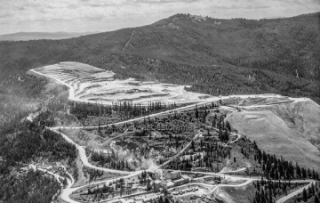Asbestos Clinic Appealing $6M in Fines and Penalties

The Center for Asbestos Related Disease clinic, known as CARD, is asking an appeals court to reverse a 2023 ruling. A jury verdict found the Montana-based health clinic filed 337 false claims for patients who received Medicare and other benefits they weren’t qualified to receive. CARD was then on the hook for nearly $6M in fines and penalties.
The verdict was the result of a lawsuit the Burlington Northern Santa Fe Corporation Railway filed against CARD. Courts have already established BNSF shares some responsibility for spreading asbestos in and around the Libby area when shipping the toxic mineral via rail.
BNSF questioned the authenticity of many of the asbestos-related cases from the clinic. The railway’s lawsuit claims the clinic over-diagnosed asbestos-related diseases and submitted claims on patient’s behalf without confirming that the patients had an asbestos-related disease.
CARD was created in 2000 to treat people exposed to toxic asbestos in the Libby, Montana area. The nonprofit health clinic offers medical screenings and resources for people who may have been exposed to asbestos. Its services include full physical examinations, X-rays, CT scans, breathing tests and blood work.
CARD attorney Tim Bechtold told a panel of judges with the 9th U.S. Circuit Court of Appeals that the clinic complied with federal law. He argued that according to a provision in the 2009 Affordable Care Act, asbestos-related diseases can be determined for Libby-area residents even without a clinical diagnosis, as long as there is other evidence of disease, like an X-ray from an outside party.
BNSF and Asbestos Contamination
BNSF Attorney Dale Schowengerdt argued an outside X-ray reader can identify abnormalities in a patient’s lungs, but can’t diagnose them as an asbestos-related disease. “The abnormality could be asbestos-related disease, but it could also be a broken rib, emphysema, past thoracic surgery, autoimmune disease,” Schowengerdt said in a statement to the Associated Press.
The railway is itself the defendant in hundreds of asbestos-related lawsuits tied to Libby. In April 2024, a federal jury said BNSF contributed to 2 deaths of people exposed to asbestos decades ago when it further spread asbestos via rail. Both Joyce Walder and Thomas Wells died in 2020 from mesothelioma.
BNSF formed in 1995 after Burlington Northern merged with Sante Fe Railway creating the largest rail network in the U.S. In 2010, investor and businessman Warren Buffett’s conglomerate Berkshire Hathaway, Inc. acquired BNSF. The company celebrated 175 years in operation in February 2024.
Libby’s History With Asbestos and CARD
Libby is a former vermiculite ore mining town. Because vermiculite and asbestos are both naturally occurring minerals that form near each other, vermiculite can become contaminated. Decades of vermiculite mining exposed miners, as well as residents of Libby and the nearby town of Troy, to deadly asbestos.
The area around the Libby mine was declared a Superfund site in 2002. The town is contaminated with hazardous materials and, according to the U.S. Environmental Protection Agency, is a candidate for cleanup. With the exception of the former vermiculite mine and the surrounding forested areas, The EPA completed its investigation and cleanup of most of the Libby area in 2018.
As of August 2024, the EPA says a 400-acre industrial site in Libby is now clean and is no longer a threat to the public. The land has been removed from the Libby Asbestos Superfund site. The EPA plans on suggesting options to also clean up the former mine and the surrounding forest over the next 2 years. The mine is the original source of the asbestos contamination and remains on the superfund list.
As CARD explains about its origins, “After the Agency for Toxic Substances and Disease Registry screenings during 2000 and 2001 identified the elevated prevalence of lung diseases, it became apparent to the community that long-term screening and specialty care needed to be established in Libby. CARD has an ongoing grant from the Center for Disease Control and Prevention and ATSDR to continue this service.”
The clinic filed for Chapter 11 bankruptcy in August 2023, soon after the jury ruled the clinic would need to pay nearly $6 million in penalties. Court documents show CARD has certified more than 3,400 people with asbestos-related diseases and has received more than $20 million in federal funding.